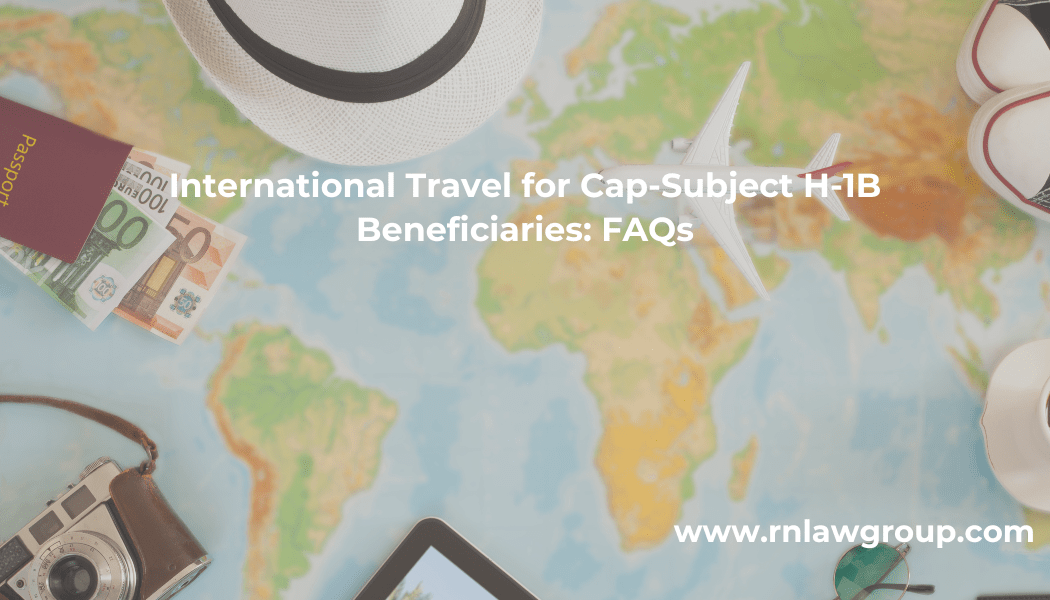
International Travel for Cap-Subject H-1B Beneficiaries: FAQs
If you were selected in this year’s H-1B lottery and your cap-subject petition has already been filed before the June 30 deadline, it’s important to understand how international travel could impact your case. Cap-subject H-1B petitions are subject to specific timing considerations—notably, even after approval, H-1B status cannot take effect until October 1, the beginning of the U.S. government’s fiscal year. Travel outside the U.S. during this interim period may carry risks, particularly if your petition was filed as a change of status. Careful planning is essential to avoid issues such as denial of re-entry or unintentional abandonment of the change of status request.
Can I travel while the H-1B petition is pending?
Yes, but doing so will require the additional step of consular processing in order to activate the H-1B status later. If the I-129 form requested a change of status, then departing the U.S. while it is pending is considered abandonment of the application, and the “change of status” portion of the petition will be automatically denied by USCIS. Even if the change of status is denied, the rest of the petition, which requests your classification as an H-1B worker, can still continue processing, and if approved, would result in an I-797 Approval Notice that does not include the I-94 attachment. Similarly, if the I-129 form requests consular processing instead of a change of status, the approved petition would result in an I-797 Approval Notice without the I-94.
In both scenarios (an abandoned change of status or consular processing), even if the H-1B beneficiary returns to the U.S. by October, their status would not automatically change to H-1B on October 1. Activating the H-1B status would require traveling to a U.S. consulate abroad, applying for and receiving the H-1B visa stamp, and re-entering the United States with the visa stamp and approval notice in H-1B status. Or, the change of status may also be carried out without travel if the same employer files another H-1B petition requesting the change, which would require re-submission of the application documents and fees.
For applicants who will have difficulty scheduling an H-1B visa appointment within the desired timeframe, or whose employers will not file a second application, it may therefore be best to avoid travel this summer, and to have the petition filed requesting a change of status so that the H-1B employment will go into effect automatically on October 1.
Another consideration for travel during this period is whether the beneficiary will encounter difficulty re-entering the U.S. before October 1 in their current nonimmigrant status. For applicants who are currently in F-1 status, for example, even if their F-1 visa stamp is unexpired, CBP may question whether it is the appropriate status for their admission when the applicant has completed their degree program and is entering with the intention to work full-time.
Can I travel after the H-1B petition is approved and re-enter the U.S. in my current status before October 1?
Yes, but it may result in an I-94 “mismatch” that could require another trip to fix. If your H-1B application has been approved with the change of status request (with the I-94 card attached to the approval notice), then travel afterward would not result in the abandonment described above (please note that you may still face increased questioning at the border when trying to re-enter in your current status, as described above). However, if you successfully re-enter the U.S. in your current status, you will receive a new I-94 record from CBP, which will not match the I-94 number on your I-797 Approval Notice. The change of status would still go into effect as long as you are physically in the U.S. on October 1, but the mismatched I-94 numbers could cause difficulty for driver’s license renewals or social security number applications, as the government’s SAVE system uses I-94 numbers from entry for verification purposes.
The mismatch could be cured by another trip outside the U.S. after October 1 and re-entering in H-1B status, after which the H-1B I-94 you are issued at re-entry supersedes any prior I-94s. Such a trip could also potentially be done without applying for an H-1B visa stamp through the consulate by traveling to Canada or Mexico for less than 30 days and using CBP’s automatic revalidation policy to return.
Can I travel after October 1?
If the H-1B petition has been approved, the beneficiary has not traveled since it was filed, and the change of status takes effect on October 1, then international travel after that date will not impact the application or H-1B status. However, the beneficiary will need to apply for an H-1B visa stamp at a U.S. consulate abroad before returning to the U.S., as their prior visa status will no longer be valid. Given the current administration’s heightened scrutiny and the increased incidence of delays, denials, and unpredictability in consular processing, we strongly recommend avoiding international travel unless absolutely necessary, especially if visa stamping will be required.
What if I am eligible for the cap-gap extension?
For beneficiaries currently in F-1 status whose OPT work authorization expires before October 1, the timely filing of the H-1B change of status petition before the EAD expiration date results in an automatic extension of their OPT work authorization to March 31, 2026 known as the “cap-gap” extension. Departing the U.S. at any point prior to October 1, whether the H-1B petition is approved or not, voids the cap-gap extension and the beneficiary would be unable to return to the U.S. in F-1 status. Applicants in this situation would need to plan on remaining outside the U.S., applying for the H-1B visa stamp from a consulate abroad, and then returning to the U.S. in H-1B status in October.
Traveling internationally prior to October can therefore have significant consequences on the H-1B beneficiary’s status and the timing of their return. Cap-subject H-1B beneficiaries should make their employers and/or attorney aware of any prospective international travel prior to the petition being filed, so that appropriate preparations can be made in advance.
By: Rebecca Chen
Rebecca Chen represents clients in employment-based nonimmigrant and immigrant visa cases. Her years of experience have made her a knowledgeable resource for complex business immigration matters.
She takes satisfaction in helping employers and workers navigate the complicated immigration framework to meet their staffing and career goals in a practical and efficient manner. She advises clients through all stages of the temporary visa and permanent residency process, including filings with USCIS and DOL and processing at overseas consulates.

